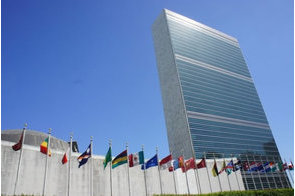Corporate best practices are key to achieving sustainable development

Summary
Highlighted in SDG 16, peace, justice, and strong institutions can be considered the primary catalysts of sustainable development.
Four hundred percent. That's how much nations who are focused on incapacitating the machineries of corruption, and bolstering the rule of law, could potentially increase their national income. This estimate is mostly linked to the fact that illegal activities, such as bribery, theft and tax evasion, cost developing countries an annual average of $1.26 trillion in income. Such a hefty amount can contribute immensely to filling the financing gaps in the efforts towards achieving sustainable development in the countries concerned.
In states and economies saturated with corruption, and where various malpractices occur without let or hindrance, businesses have been known to play a facilitating role, sometimes even forming a 'symbiotic' relationship with corrupt governments and their institutions. Ironically, businesses are also significantly harmed when the ecosystems they operate in are polluted by criminal activities and corrupt tendencies. In such instances, the functioning of the justice system and other institutions is also dependent on corporate organisations – and not only public institutions. Therefore, breaking the ‘fingers’ of corruption is not a government-only responsibility.
Highlighted in the United Nations' 16th Sustainable Development Goal (SDG), peace, justice, and strong institutions can be considered the primary catalysts of sustainable development. Even as meeting the targets of SDG 16 is vital to realising the other SDGs, their significance to businesses has, perhaps, not been fully comprehended.
Effective, accountable and transparent businesses are in no way of secondary importance to enabling the environment in which economies and societies can thrive. And both public and private institutions alike must be effective, accountable and transparent if they are to ultimately become strong pillars for stability and greater progress in the economies and societies in which they operate.
This requires businesses to be quite effective in their approach to good corporate governance. They also need to embrace ethical business models, green their operations and deliver on the expectations of their diverse stakeholders.
Interestingly, the most recent Edelman Trust Barometer shows, through the timeline of the Covid-19 pandemic, how companies are now widely perceived as trusted societal actors — something like being morally 'verified' in people's minds. It is, however, worth emphasizing that although these findings substantiate the now-popular belief that corporate bodies should play a greater role in addressing societal issues, businesses – no matter how responsible they are – cannot replace the roles of local or regional governments. Therefore, it is imperative that government at all levels, as well as businesses of all sizes, team up and hold each other's hands in transparency and accountability.
As a financial institution known for its strong reputation as a responsible business, Access Bank has incorporated ESG (environmental, social and governance) policies into its growth and value-creation strategies. Apart from supporting the economic growth, development, and prosperity of communities where it operates, the Bank has seen its employees commit over 2.7 million hours of their time through its employee volunteering scheme. The scheme has impacted more than 510 communities across Nigeria's six geopolitical zones.
Furthermore, Access Bank shares an intimate working relationship with a number of international bodies and their teams. Amongst these are the United Nations Environment Programme Finance Initiative (UNEP FI) team, which the bank worked closely with (as the only commercial bank from the West African region), alongside other leading banks, to develop what is now known as the Principles for Responsible Banking (PRB).
The PRB serves as the global standard for banking institutions — specifically as a resource base for enabling banks to successfully transition to a 'responsible' operational model. It was through serving as the continent's Consultative Lead in developing the Principles that Access Bank was able to drive the participation of other banks that are now signatories to the PRB.
With its strong commitment to transparency and accountability, Access Bank pioneered sustainability reporting in the Nigerian financial sector and has consistently published stand-alone sustainability reports that are made accessible to its stakeholders. The bank also has a track record of reporting on the implementation of the Nigerian Sustainable Banking Principles, Equator Principles, UN Global Compact (UNGC), UN Principles for Responsible Banking (PRB), UN Principles for Responsible Investment (PRI), and its stand-alone Sustainability Report is in accordance with the Global Reporting Initiative (GRI).
What some call 'corporate purpose' (a phrase for what a company overwhelmingly prioritises as its objective above and beyond commerce and profit-making), in conjunction with responsible capitalism, is gaining the attention of business leaders around the world. It is spurring businesses to embrace efforts at tackling challenges and fulfilling societal expectations. And as this attitude increases in popularity and adoption, larger business organisations, especially multinationals like Access Bank that have long been committed to sustainability and corporate social responsibility, will be instrumental in accelerating progress and realising the target of a sustainable world.
Mofifoluwa Olawumi is a Team Member, Sustainability, Access Bank PLC.
Related
-
UNDP unveils a new development blueprint for the 21st century
The plan identifies six “signature solutions” against which UNDP will now align its resource and expertise, to ...
-
Germany’s Achim Steiner appointed as new Administrator of UNDP
President of the UNDP Executive Board welcomed Achim Steiner's appointment on behalf of members of the Board.
-
Global coalition set to launch One for All campaign for sustainable development
#ONEFORALL campaign will provide a platform for each global citizen to support one of the 17 SDGs.







